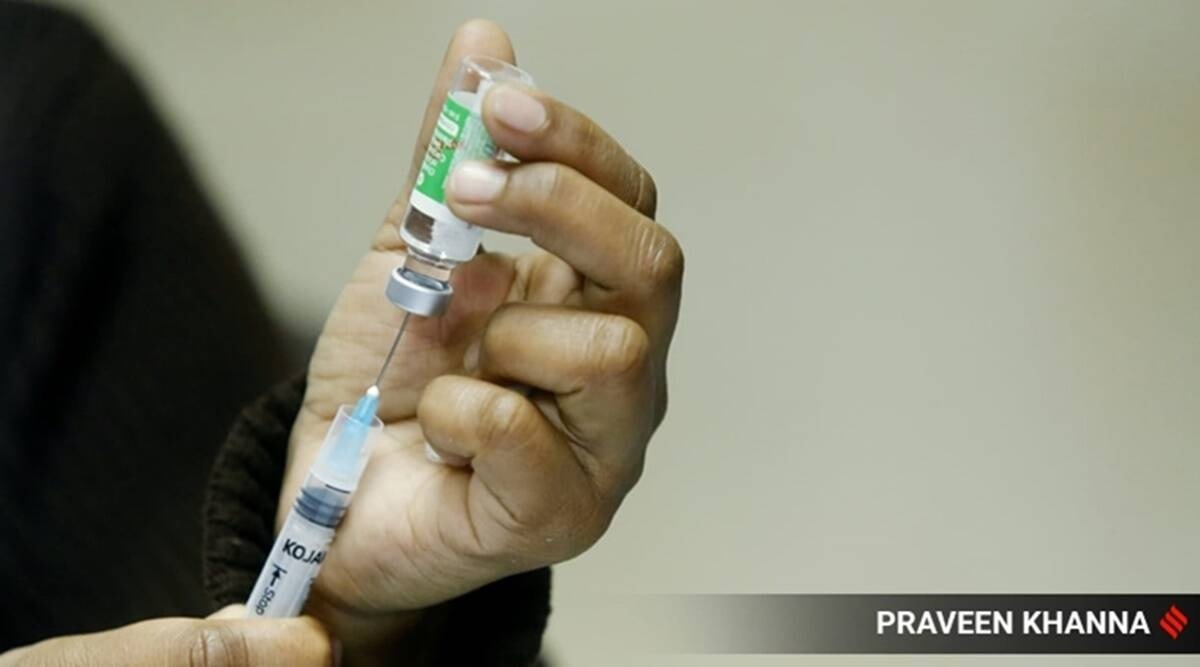 The government's insistence on registering and booking a slot online through CoWIN makes it especially difficult for these citizens to get vaccinated.
The government's insistence on registering and booking a slot online through CoWIN makes it especially difficult for these citizens to get vaccinated. *Shahabuddin Karikar’s employer at a construction site in Mumbai’s western suburb Malad asked him to get vaccinated. The 30-year-old labourer has an Android phone but no data pack. He tried to use the phone of a neighbour in Behram Baug slum to register online, but failed.
“After some time, I gave up. I don’t understand how to do it. I will get vaccinated when I go back to my village in West Bengal later this year,” he said.
*In Malvani slum 10 km north of Malad, Zulekha Mehboob Mulla (41) managed to register herself on CoWIN, but could not book a slot after trying for three days with her slow Internet connection. Desperate to get the shot, she showed up at a vaccination centre in NESCO on May 8. After she had waited for two hours, she was turned away.
“They said book online and come,” Zulekha said.
According to government estimates, over 40 per cent of Mumbai’s 1.3 crore population lives in slums. A large section of the slum population either does not have a smartphone or is not adept at handling one. The government’s insistence on registering and booking a slot online through CoWIN makes it especially difficult for these citizens to get vaccinated.
Also, vaccines are in short supply, and many among this population simply do not have the time to keep trying for a slot. Karikar said he earned Rs 200 after working for 12 hours at the construction site: “I don’t have the time to sit and keep trying for a slot.”
While there are no data, officials at various vaccination centres in Mumbai estimated that the turnout from slums was “very poor”. The civic body stopped walk-ins last week, making pre-registration on CoWIN mandatory for everyone except those getting the second dose of Covaxin, after several centres reported massive crowds and anger over long waiting times.
42-year-old domestic worker Sunita Wagh got her first dose of Covishield last month, and intends to go for her second shot next week. She does not know she will no longer be able to simply stand in line like she did the first time. No health official or public health representative has visited the Versova slum colony of a hundred-plus homes where she lives.
“I do not know much about this… I got the vaccine because my employer insisted I do. I went to Cooper Hospital and stood in line for five hours. I will go again next week,” she said. Wagh does not have a smartphone and knows nothing about CoWIN or pre-booking slots.
“We are trying to help each other. Some youngsters know how to register, and we depend on them,” said Meenakshi Lade, a resident of the same colony. Residents said they had many questions about getting vaccinated, but there was no one to ask. They said they had heard that a local corporator was helping people register on CoWIN at an office of his party. “But how many will reach there? Most are scared. If they can visit our homes during elections, why can’t they come now?” asked a resident.
But there are also places where things are working differently.
At Dharavi’s Chota Sion hospital vaccination centre, a team of data operators is helping a long line of slum-dwellers register for vaccination and book a slot online. A van fitted with a public address system rolls through the lanes, blaring out the message of vaccination.
“Most of those who come here are not educated, do not have access to technology, and do not understand how to register on the CoWIN app. So we decided to set up a registration desk with data operators to guide them,” Dr Virendra Mohite, medical officer of G-North ward that covers Dharavi, said.
In M-East ward, one of the poorest in the city, Tata Institute of Social Sciences, with assistance from the BMC, is running a field action project called Community-Led Action Partnership (CLAP).
Volunteers are allaying people’s fears, busting misinformation, and ferrying residents to vaccination centres in a bus. Over 500 people have been vaccinated through the initiative so far. M-East ward is home to over 8 lakh people as per the 2011 Census, and the initiative has reached out to people from areas like Mankhurd and Govandi in the eastern suburbs.
Local corporator Samiksha Sakhre has set up desks to help people register for vaccination. She has visited homes along with volunteers to talk to people, and to show them pictures of neighbours who took the shot to instill confidence. “Many people have lost their jobs, and do not even have the money to travel to a public hospital a few kilometres away,” Sakhre said.
Avinash Madhale, a senior programme coordinator with CLAP, underlined the need for a massive awareness campaign in the city’s slum pockets. “With pre-registration made mandatory, there is a need to have digital volunteers who can help those without access to technology to book slots. There is also a need to conduct outreach through creative campaigns,” Madhale said.
Mumbai’s slums could, in fact, be turning increasingly vulnerable to infection. Three sero-surveys have shown consistent antibody decay among the slum population — from 57 per cent last July to 41 per cent this March. While the vaccine crunch in Mumbai is expected to ease by next month, in the absence of proactive measures, slums are likely to remain at the bottom rung in inoculation coverage.
- The Indian Express website has been rated GREEN for its credibility and trustworthiness by Newsguard, a global service that rates news sources for their journalistic standards.

